Updated September 2024
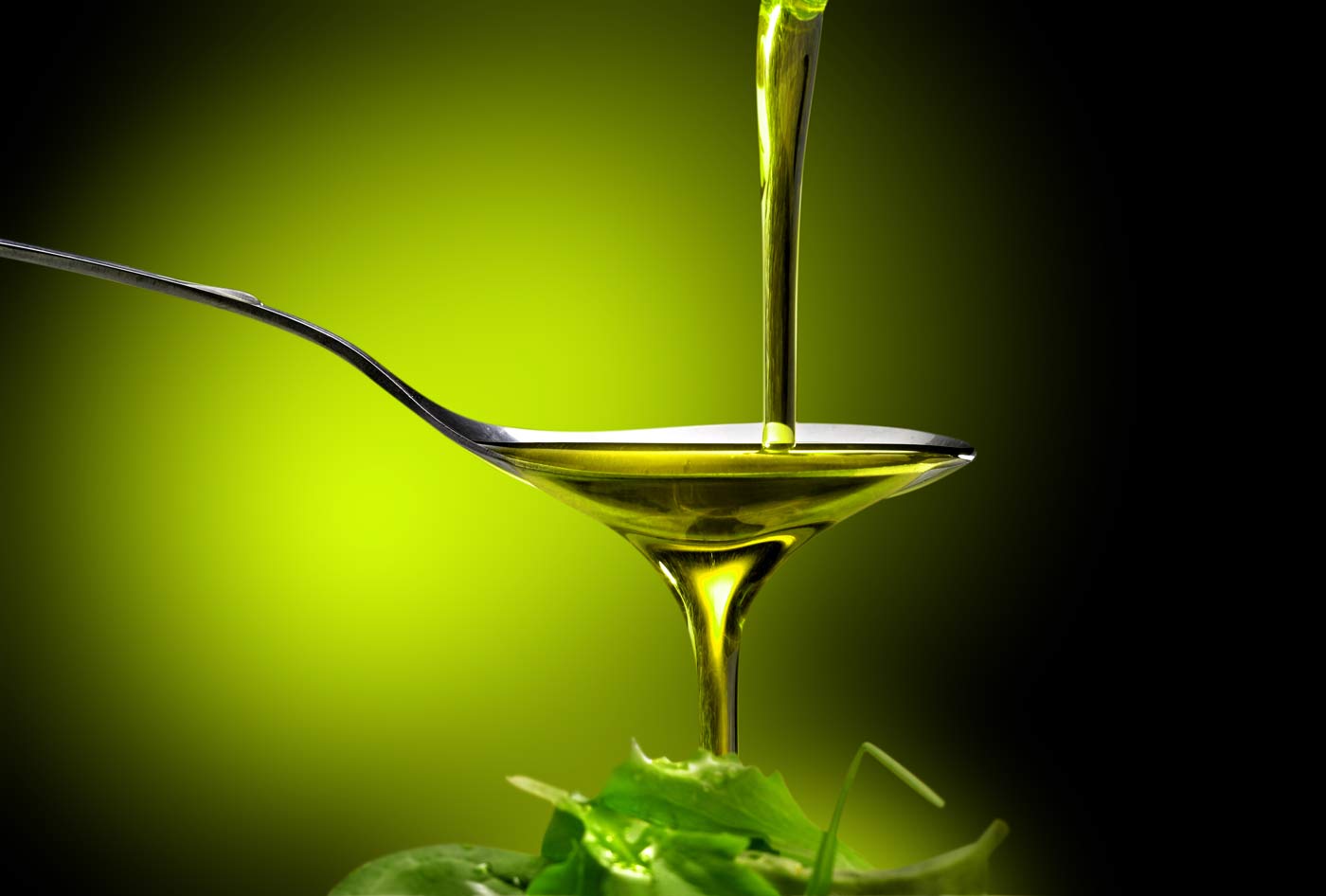
It’s a question everyone wants the answer to.
The simple answer is that not all oils are created equally. When it comes to boosting your health, no oil is quite as potent as Extra Virgin Olive Oil (EVOO).
According to numerous research studies, EVOO is far superior to its regular counterpart, seeing as it is produced using pure, cold-pressed olives.
While most normal store-bought olive oil is a cheap blend of more processed oils, and only a select few cold-pressed oils, EVOO is different – mainly due to the fact that is high in phenolic content.
In a nutshell, high phenolic olive oil is olive oil that has a high percentage of phenolic compounds.
Otherwise known as polyphenols, these compounds are directly linked to the many health benefits provided by EVOO, which we’ll discuss in a moment.
Nearly every variety of olives has the potential to produce EVOO – but only a select few actually carry high polyphenol levels.
That’s why it’s so important to choose an EVOO that is produced using not only a specialized cold-pressing process, but the highest quality of Olympia olives on the planet. But we’ll get to that later…
Phenolic compounds in EVOO keep the oil stable while presenting certain anti-inflammatory and anti-atherosclerotic properties (protecting against heart disease), along with powerful antioxidizing action.

A quick “Google” for “Polyphenols” will reveal a mountain of information on the powerful effects of polyphenols on the human body – but it’s a lot to research. So, we’ve done all of the research on your behalf.
Without further ado, here are the top 10 benefits of polyphenol rich olive oil, and how consuming EVOO every day can have a significantly positive impact on your overall well-being.
Unhealthy oils can raise your blood pressure and cholesterol levels, which can result in serious illness. EVOO combats this, which ncbi.nlm.nih.gov talks about in an article on the potential health benefits of olive oil and plant polyphenols.
According to the source, both conventional and alternative medicine utilizes the power of olive oil and leaf extracts to treat health issues relating to blood pressure, like arterial hypertension and atherosclerosis.
According to the same source, olive oil and olive leaf extract have been shown to lower blood pressure in studies on animals, while promoting more blood flow to the coronary arteries. All of this while slowing down heart rate and regulating muscle contractions in the intestines.
Speaking of the heart, recent research shows that the polyphenols found in EVOO are significantly beneficial to cardiovascular health.
One study looked at the oil’s anti-inflammatory and antioxidant effects in healthy adults, and the results showed that subjects experienced lower levels of inflammation following dedicated EVOO consumption – along with impressive antioxidizing effects.
But what compounds do we have to thank for this remarkable cardiovascular protective action?
Experts have spent decades studying the subject, and it turns out, some of the most powerful phenolic compounds go by the names of oleuropein and tyrosyl accordingly.
These potent polyphenols have been shown to support a long list of biological activities, including antioxidizing action.
Research shows that this can prevent certain cardiovascular risk factors, including hypertension, plasma lipid disorders, endothelial dysfunction, obesity, type 2 diabetes, and atherosclerosis.
More and more medical professionals worldwide are hailing EVOO and the mounting evidence showcasing its power to deliver impressive health-protective action – starting with the heart.
The polyphenols found in EVOO have been shown to optimize circulating cholesterol as well as triglyceride levels, while reducing LDL oxidation. EVOO has also been shown to optimize glucose metabolism.
The secret lies in EVOO’s ability to activate numerous metabolic pathways, which, in turn, can optimize lipid metabolism and glycemic control while lowering blood pressure and endothelial damage.
Long story short, the benefits of polyphenol rich olive oil are obvious, and adding extra virgin olive oil to your daily diet is a no-brainer.
Healthy immunity is key to protection against inflammatory disorders and diseases like cancer.
You can count on EVOO for an immunity boost, according to an article released by ncbi.nlm.nih.gov.
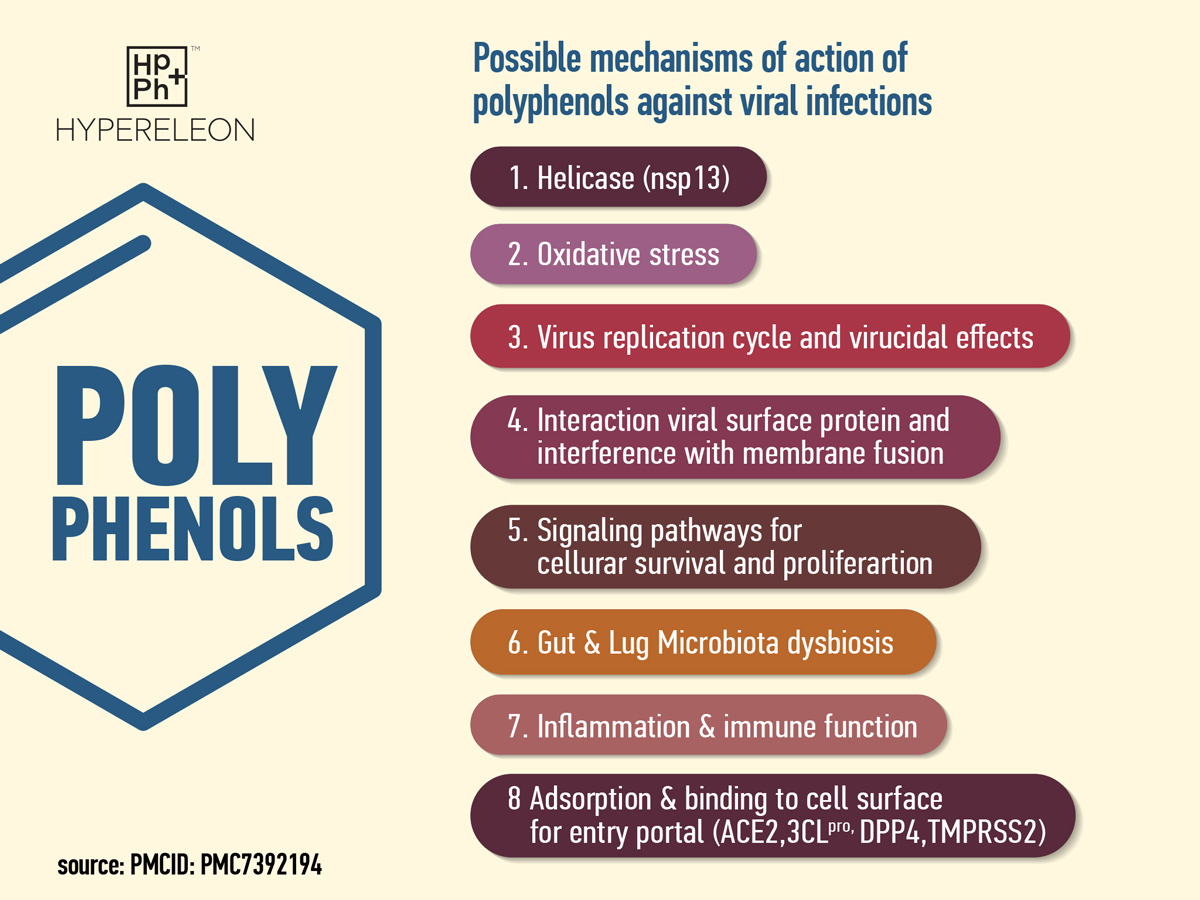
The source speaks of numerous scientific studies which showcase the potential of polyphenols in modulating, regulating, and strengthening the human immune system.
We won’t get too deep into the confusing science of it all, but know this – polyphenols affect the spread of white blood cells and cytokines, among various other factors that strengthen immune defense.
Enough sneezing, coughing, and spluttering.
EVOO’s phenolic compounds fight allergies so you can enjoy lasting relief. ncbi.nlm.nih.gov’s article speaks of polyphenol’s tough anti-allergenic power.
Another article release by NIH explores polyphenol’s influence on allergic immune reactions in more detail.
According to the source, dietary polyphenols – like the ones found in Extra Virgin Olive Oil – have been found to have a major impact on three common allergic diseases in humans.
These include asthma, food allergies, and eczema. Polyphenols prevent the development of allergies, which can significantly reduce symptomatic distress and improve the sufferer’s life immensely.
All by drinking or eating a little EVOO every day – who knew?
Numerous sources speak of the effect of polyphenolic compounds on mental health. According to Hindawi.com, these compounds – which are found in EVOO – have been found to prevent the development of neurogenerative diseases like Alzheimer’s and Dementia.
On a biological level, these polyphenolic compounds work to gradually improve the user’s mental well-being by modulating and strengthening brain plasticity, cognition, mood, and behaviors. The source further hails polyphenols for their ability to combat and improve the symptoms of depression.
Frontiers In Neuroscience also explores the concept of how dietary polyphenols are closely connected to gut microbia, and how they can alleviate the signature signs of depression on a biological level.
Polyphenols even have the potential to build cognitive resilience to certain neuropsychiatric disorders, although more research is needed in this field according to the same source.
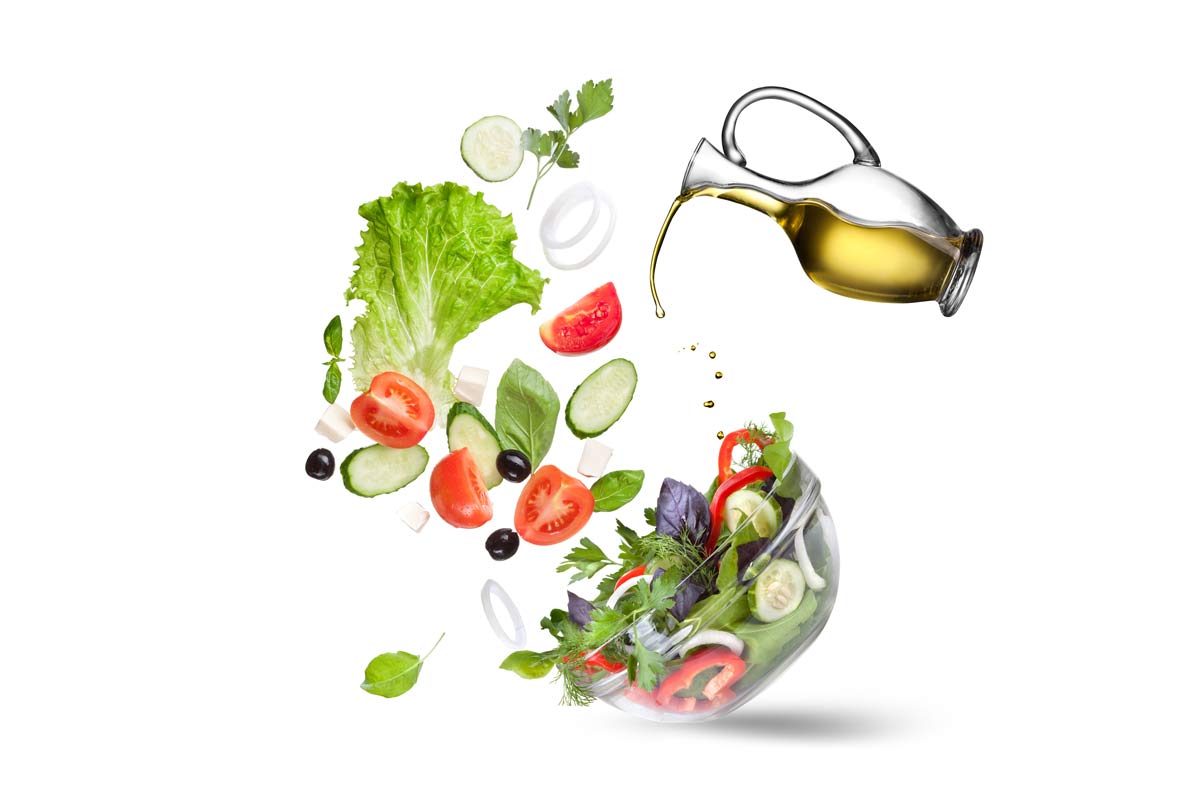
Did you know that EVOO can actually lower your risk of developing Type 2 Diabetes?
This oil boosts insulin effectiveness to balance blood sugar, according to WebMD.
According to an article released by the medical journal, the rich antioxidants found in polyphenols have been found to potentially improve blood sugar in high-risk individuals who could develop conditions like diabetes and heart disease.
According to the same source, the researchers of a particular study discovered that polyphenols work to improve blood sugar by improving the way in which the body actually metabolizes sugar.
In one particular study, 45 overweight – or obese – people followed a diet either low in omega-3 fatty acids, rich in omega-3 fatty acids, rich in polyphenols, or rich in both omega-3 fatty acids and polyphenols.
The results of the study revealed that those on low omega-3 fatty acid diets lost the most weight during the 8-week study period, but those on the rich polyphenol diet experienced more significant improvements to their insulin and blood sugar levels.
The same diet also sparked improvements in the functionality of the pancreas.
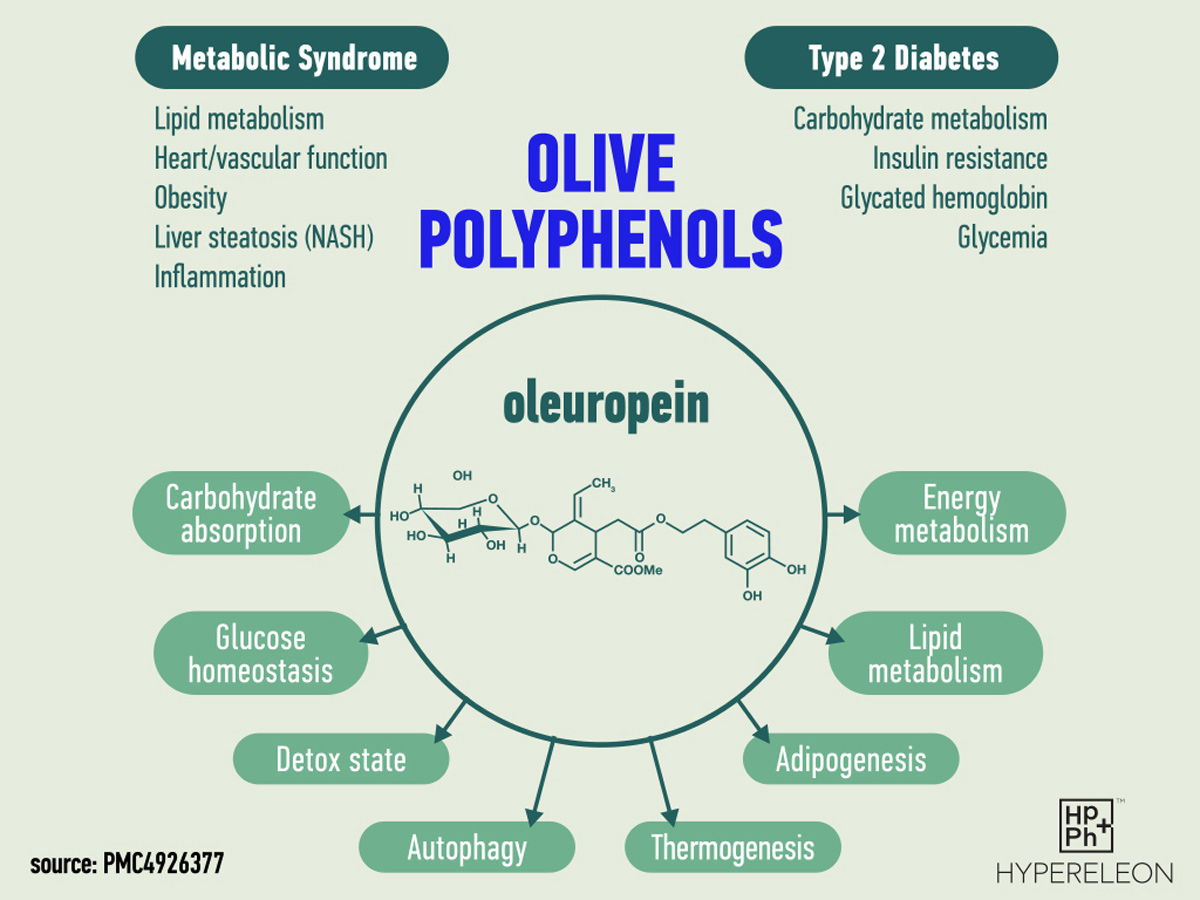
Recent research shows that the phenolic compounds in olive oil have a protective effect on red blood cells, coupled with protein stabilizing action.
But one of the most interesting developments is the discovery of EVOO’s role in easing the symptoms of metabolic syndrome (MS).
MS is becoming a growing health problem worldwide, affecting around 31% of the global population as we write this.
Sadly, this number is expected to rise to 50% of all human beings within the next 15 years.
Thankfully, EVOO – coupled with a diligent Mediterranean diet – could have a positive influence.
While there are many ways in which EVOO can improve MS symptoms, its ability to modify lipidic metabolism is one of them.
According to NDTV, polyphenols are linked to successful weight loss efforts.
Why?
Because these powerful micronutrients – a crucial part of any diet – proactively strengthen the human digestive system. This promotes faster weight loss and fat burning action that is easy to maintain with ongoing consumption of polyphenols.
According to NCBI, polyphenols have been linked to the modulation of the body’s molecular and physiological pathways.
In more simple terms, these pathways are responsible for metabolizing energy and controlling the onset of obesity. And by lowering your chance of gaining weight, you could in turn experience a reduced risk of developing many of the disorders that are commonly associated with obesity, such as diabetes and heart disease.
High concentrations of polyphenols – which are found in EVOO – have a strong antioxidizing effect on the body, which may also improve cognitive function and control the mental side of weight problems. According to the same NCBI article, polyphenols further suppress fat absorption from the gut while reducing chronic inflammation.
Phenolic compounds have been proven to offer various “anti” effects.
According to NCBI, the benefits of polyphenols reach far beyond anything any of us could have imagined – from antioxidant to anti-allergic, anti-inflammatory, anti-thrombotic (reduces blood clots), anti-atherogenic (removes cholesterol from cells), and anti-mutagenic action.
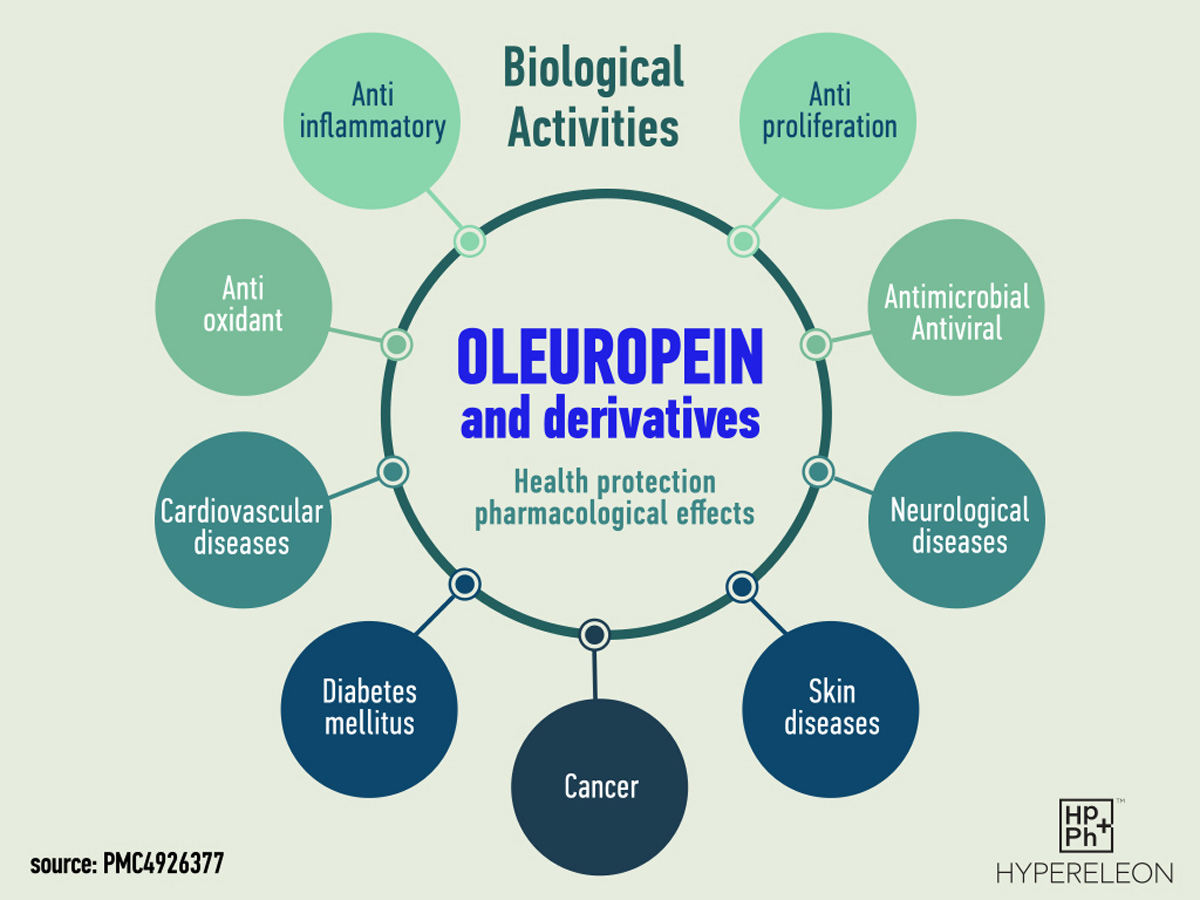
These diverse beneficial impacts have been studied and evaluated in a multitude of scientific research studies. Polyphenols have been shown to significantly impact various biological activities in the body, like modulating the immune system (which we spoke about earlier).
In fact, NCBI speaks of polyphenol’s ability to function as efficient anti-cancer agents – which are easy to incorporate into your diet through EVOO. The same NCBI article talks about much higher how Virgin Olive Oils are in phenolic compounds than regular refined olive oils. These phenolic compounds are what give EVOO its trademark bitter taste.
Growing evidence on this topic is becoming impossible to ignore, and medical communities worldwide are urging people to follow a Mediterranean diet as far as possible – particularly for its undeniable anti-inflammatory properties.
Polyphenolic compounds hold natural anti-inflammatory power, which is changing lives worldwide – and rheumatoid arthritis patients are among them.
EVOO’s anti-inflammatory properties have been shown to protect the joints to ease pain.
It's no secret that free radicals can cause severe cell damage, which has been linked to numerous diseases the likes of diabetes, cancer, and arthritis.
Antioxidants hold the power the combat this oxidative stress, and EVOO is filled with antioxidant molecules that can modulate oxidative pathways.
Another “anti” superpower to add to EVOO’s repertoire is its anticoagulant action, meaning it may help to prevent blood clots.
Recent research shows that the phenolic compounds found within EVOO can trigger anticoagulant activities within the body. Anticoagulant action like this could play a key role in thrombotic disorder prevention and treatment.
Inflammation can be painful, but EVOO can help with that - with its antioxidants that reduce swelling all over the body.
It’s not necessarily the olive oil itself, but what’s inside it, which is – once again – polyphenols.
When it comes to inflammation, polyphenols are incredibly powerful. Once they’re inside the body, they have been shown to regulate cellular activities within inflammatory cells, according to NCBI.
Once of the most powerful polyphenols found in EVOO is Oleocanthal, which works in a similar way to ibuprofen – one of the most commonly prescribed drugs for inflammation in the world.
According to Healthline, chronic inflammation is considered a leading cause of diseases like metabolic syndrome, Alzheimer’s, arthritis, heart disease, cancer, and obesity. By consuming a little EVOO each day – making sure it’s high-phenolic olive oil – you can enjoy the powerful anti-inflammatory impact of polyphenols.
According to scientists, 3.4 tablespoons, or 50ml, of Oleocanthal showcases a similar effect as 10% of Ibuprofen’s adult dosage. Further research shows that olive oil’s main fatty acid, oleic acid, holds the power to reduce the levels of certain crucial inflammatory markets found in the body, like C-reactive protein.
EVOO contains something called “Sitosterol,” which regulates cholesterol absorption.
In simple English, your digestion tract will be healthier than ever – and research proves it.
According to Healthline, we can boost our digestion through regular consumption of polyphenols.
NCBI also hails polyphenols for their positive impact on the digestive tract, along with the liver.
Medical News Today talks about how the fats in high-phenolic olive oil may smoothen the inside of your bowel, which makes it much easier for stools to pass through. This also boosts water retention in stools, which has been found to ease the pain of constipation.
Experts suggest consuming a tablespoon of high-phenolic olive oil every morning, on an empty stomach, to relieve constipation. This is a tried and trusted wellness secret used by many healthy adults. Although, it’s important not to consume more than this to avoid cramps and diarrhea.
The truth is olive oil has been used for hair, skin, and nails since ancient times. Naturally, olive oil is packed with valuable anti-aging antioxidants and hydrating factors, making it ideal for body use.
Honestly, there are so many benefits to consuming high-phenolic extra virgin olive oil, we’d be here all day if we were to list them all. The fact that it’s so delicious is a bonus!
Extra Virgin Olive Oil has been used by athletes for centuries to improve their performance naturally.
Even today, thousands of athletes all over the world use EVOO's polyphenols to enhance their performance. Polyphenols work by reducing oxidative damage and cholesterol levels, strengthening the heart, building stronger bones, and increasing energy levels.
This makes Extra Virgin Olive Oil the perfect choice for athletes looking to improve their performance naturally.
It’s clear to see, as per the stacks of research from medical journals and credible sources online, that EVOO is the healthiest olive oil in the world owing to its high phenolic content. But – just buying the first EVOO you see in the store isn’t enough.
If you want to enjoy the full benefits of olive oil, you need to carefully choose the best Extra Virgin Olive Oil that is high in phenolic content.

The healthiest olive oils in the world are high in phenolic content, and one of the world leaders in high phenolic olive oil is Hypereleon. This medical-grade olive oil has a powerful composition of compounds that’s been proven to boost our well-being.
Hypereleon is an award-winning EVOO that’s trusted and adored by thousands of healthy families worldwide.
The difference between regular olive oils and Hypereleon is that the latter is produced using a meticulous cold-pressing process, with olives of the Olympia variety (naturally high in polyphenols).
These beautiful olives are carefully selected from the best olive groves in the highlands of Arcadis, Peloponnese, Greece, at very high altitudes, from trees that are thousands of years old.
Hypereleon’s range of unfiltered and chemical-free EVOOs are not put through heating processes, which is critical for preserving the nutrients inside – namely, polyphenols.
If you want to enjoy all of the benefits discussed of high-phenolic olive oil in this article, it’s critical to invest in your health by choose a high-phenolic Extra Virgin Olive Oil like Hypereleon. Explore Hypereleon’s award-winning range of high-phenolic olive oil today.
Extra Virgin Olive Oil is easy to start including in your diet. Use it raw over salads and dishes, and try raw in the morning before breakfast to get the most benefits and the highest polyphenol content.
Hypereleon has 10 times the phenolic compounds of standard EVOOs, so why not add yours to your cart now? Your body will thank you for it for years to come!
Polyphenol-rich olive oil is extra virgin olive oil with lots of polyphenols/polyphenolic natural ingredients, like Oleocanthal, Hydroxytyrosol, Oleacein, Oleuropein, Tyrosol and Ligstroside. It has a strong flavor and a bit of a peppery kick because is loaded with antioxidants and fights inflammation and other diseases.
The olive oil with the highest polyphenol content may vary depending on the specific brand and harvest. However, certain olive oils, such as extra virgin olive oil (EVOO) made from early-harvested olives, tend to have higher polyphenol levels. Look for olive oils labeled as "high in polyphenols" or "early harvest" like HYPERELEON for a better chance of finding higher levels of polyphenols.
The Extra Virgin Olive Oils with the highest in Polyphenol content are:
Greek olive oil is rich in polyphenols, known for various health benefits. Studies suggest it can reduce blood pressure, lower cholesterol, and even possess anti-cancer properties.
Greek olive oil is considered one of the healthiest options. Harvesting in September or early October ensures olives are unripe and green, resulting in oil with high polyphenol content. Unripe green olives produce oil with abundant aromatic compounds and rich polyphenols.
High phenolic olive oil is defined as containing at least 250 mg polyphenols per kilogram of oil. It also contains at least 30 different phenolic compounds, including Oleocanthal, Hydroxytyrosol, Oleacein, Oleuropein, Tyrosol and Ligstroside.
According to a great number of scientific studies & clinical researches, Polyphenol-rich olive oil offers numerous health benefits, including:
Polyphenols act as antioxidants, helping to neutralize harmful free radicals and reduce oxidative stress in the body.
Polyphenol-rich olive oil has been associated with improved cardiovascular health, including reducing the risk of heart disease and improving cholesterol levels.
The anti-inflammatory properties of polyphenols can help alleviate inflammation in the body, which may contribute to chronic diseases such as arthritis and certain cancers.
Some polyphenols in olive oil exhibit antimicrobial properties, helping to inhibit the growth of certain bacteria and fungi.
Polyphenols have shown potential in preventing and inhibiting the growth of cancer cells, particularly in the breast, colon, and prostate.
Research suggests that polyphenols in olive oil may have neuroprotective effects, reducing the risk of cognitive decline and neurodegenerative diseases like Alzheimer's and Parkinson's.
Polyphenol-rich olive oil has been linked to improved weight management and reduced risk of obesity.
The polyphenols in olive oil may promote a healthy gut microbiota and support digestive function.
There are no known side effects related with consuming polyphenol-rich olive oil. At least related with its phenolic content.
However, it's important to note that while polyphenol-rich olive oil offers numerous admirable health benefits, in general olive oil should be consumed as part of a balanced diet and lifestyle. Moderation is key, as olive oil is calorie-dense. Consulting with a healthcare professional or nutritionist can provide personalized advice based on your specific health needs.
High-Phenolic Extra Virgin Olive Oil (EVOO) is regarded as the healthiest variety due to its rich content of antioxidants such as polyphenols, alpha-tocopherol (Vitamin E), squalene, and oleic acid. These compounds offer numerous health benefits, including reducing inflammation and promoting heart health.
Yes, heating olive oil, including during cooking, can reduce its polyphenol content due to heat exposure. However, even after cooking, olive oil remains a healthy source of fats and beneficial compounds, making it a better choice than most other cooking oils.
To preserve its polyphenol content, opt for lower-heat cooking methods like sauting or steaming. Avoid overheating or prolonged exposure to high temperatures to maintain its health benefits. For maximum benefit, consume olive oil raw or drink it directly to fully enjoy its remarkable health properties.
It's challenging for consumers to assess it accurately at home, but It has a robust taste, accompanied by a subtle peppery sensation that stems from its abundance of antioxidants.
Actual polyphenol levels can vary depending on factors such as measurement process, olive variety, growing conditions, and processing methods. Seek reputable brands that prioritize transparency and quality that can help ensure you're getting olive oil with higher polyphenol levels.
Absolutely, extra virgin olive oil generally contains significantly higher polyphenol levels compared to lower olive oil grades.
Factors like olive variety, harvest timing, and processing methods influence the polyphenol content. To maximize polyphenol intake, one should opt for extra virgin olive oils that are labeled as "high in polyphenols" and those produced from olives harvested early.
Yes, heating olive oil, including when cooking with it, can cause some loss of polyphenols due to heat exposure.
To retain the highest polyphenol content, it's best to use low-heat cooking methods such as sauting or steaming, and avoid overheating or prolonged exposure to high temperatures. For optimal health benefits, consume olive oil raw or drink it to fully experience its impressive health properties.
Not always. Check the product labels or seek information from reputable sources to determine the specific polyphenol content of olive oils.
It's advisable to check the product labels or seek information from reputable sources to determine the specific polyphenol content of Moroccan olive oils.
| Variety | Total polyphenols |
|---|---|
| Cornicabra | 795,18- 942.64 mg/kg |
| Dahbia | 108.59- 321.06 mg/kg |
No, is not particularly high in polyphenols compared to olive oil. The total phenolic content of avocado oil is in the range of 11.1 to 13.01 mg GAE/1000 g, but it still offers other health benefits.
Olive oil Polyphenols can last between 18 to 36 months, depending on storage conditions.
To prolong its shelf life and preserve its polyphenols, store olive oil in a cool, dark place, tightly sealed, and away from direct sunlight and high temperatures. Refrigeration can also help maintain its freshness. However, even with proper storage, the polyphenol content will gradually decrease over time. For maximum health benefits, it's best to consume olive oil within its recommended shelf life to retain its high polyphenol content.
Polyphenols are abundant in a range of delectable food options such as:
The polyphenol content may differ depending on factors such as variety, ripeness, and preparation methods.
Because the blend of vegetables and olive oil formed the foundation of Greek Diet, what we recognize today as the Mediterranean diet.
The consumption of olive oil in Greece is also influenced by various factors, including cultural traditions, regional availability, and the Mediterranean diet. Olive oil, an essential ingredient in the Mediterranean diet, is widely recognized for its positive impact on health.
This renowned diet is linked to lower rates of heart disease and other chronic ailments. Greek olive oil, with its exceptional quality and taste, has been highly valued and widely used in Greek cuisine for centuries.
A recent study found that much of Greece's olive oil production boasts high phenolic content, though it hasn't always been distinguished from other varieties.
Greek olive oil is considered especially rich in polyphenols due to several key factors: